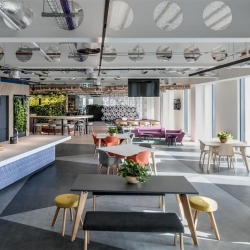To provide the best experiences, we use technologies like cookies to store and/or access device information. Consenting to these technologies will allow us to process data such as browsing behaviour or unique IDs on this site. Not consenting or withdrawing consent, may adversely affect certain features and functions.
The technical storage or access is strictly necessary for the legitimate purpose of enabling the use of a specific service explicitly requested by the subscriber or user, or for the sole purpose of carrying out the transmission of a communication over an electronic communications network.
The technical storage or access is necessary for the legitimate purpose of storing preferences that are not requested by the subscriber or user.
The technical storage or access that is used exclusively for statistical purposes.
The technical storage or access that is used exclusively for anonymous statistical purposes. Without a subpoena, voluntary compliance on the part of your Internet Service Provider, or additional records from a third party, information stored or retrieved for this purpose alone cannot usually be used to identify you.
The technical storage or access is required to create user profiles to send advertising, or to track the user on a website or across several websites for similar marketing purposes.
 A new report from Actual Experience, claims organisations are becoming increasingly concerned about the impact of digital inequality on employees, as hybrid working looks set to become the new normal. This new working model is causing concern across multiple sectors; 67 percent of C-Suite representatives cite that they’re worried these new ways of working will introduce inequalities in how people access and use digital tools. (more…)
A new report from Actual Experience, claims organisations are becoming increasingly concerned about the impact of digital inequality on employees, as hybrid working looks set to become the new normal. This new working model is causing concern across multiple sectors; 67 percent of C-Suite representatives cite that they’re worried these new ways of working will introduce inequalities in how people access and use digital tools. (more…)







 At this time of year, with events such as Happiness at Work Week and
At this time of year, with events such as Happiness at Work Week and 
 New research released by
New research released by 
 I was reminded the other day of the instructions on a bottle of shampoo I once used which said, simply: “Wash, rinse and repeat.” Why? I’ve just washed my hair. Why do I need to repeat? It’s a bit like that old adage about how to sell more toothpaste, by widening the hole it comes out of, because we all still instinctively try to cover the whole of the brush head, however thick the line of paste.
I was reminded the other day of the instructions on a bottle of shampoo I once used which said, simply: “Wash, rinse and repeat.” Why? I’ve just washed my hair. Why do I need to repeat? It’s a bit like that old adage about how to sell more toothpaste, by widening the hole it comes out of, because we all still instinctively try to cover the whole of the brush head, however thick the line of paste. 
 New polling, carried out to mark the start of
New polling, carried out to mark the start of 




 The debate about the workplace and the future of work gets more interesting by the week. In the last few days alone, I’ve listened in on three great speakers talking about the opportunities, challenges, nuances and complexities of it all in a way that has been all but impossible in the past 18 months. In addition, Nigel Oseland has published
The debate about the workplace and the future of work gets more interesting by the week. In the last few days alone, I’ve listened in on three great speakers talking about the opportunities, challenges, nuances and complexities of it all in a way that has been all but impossible in the past 18 months. In addition, Nigel Oseland has published 
 Workers are leaving jobs like never before, and it’s causing a shortage of talent that has companies around the globe reeling, according to a
Workers are leaving jobs like never before, and it’s causing a shortage of talent that has companies around the globe reeling, according to a 
 Research from
Research from 










October 13, 2021
Shift to hybrid working highlights the value of weak ties
by Mark Eltringham • Comment, Flexible working, Workplace design